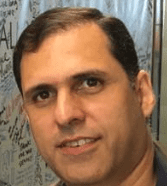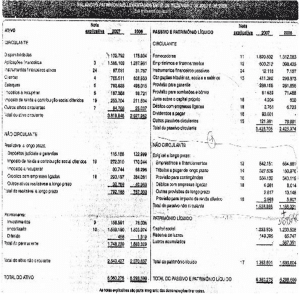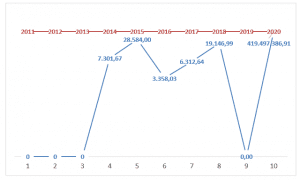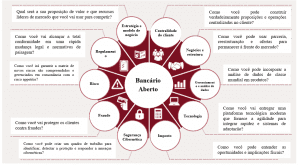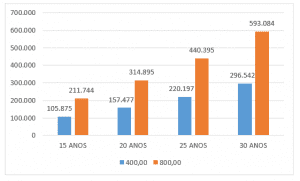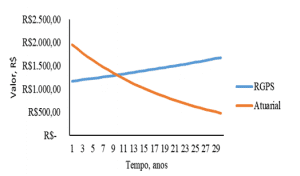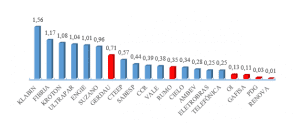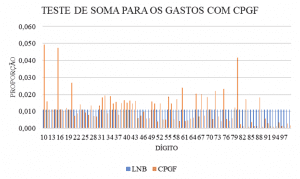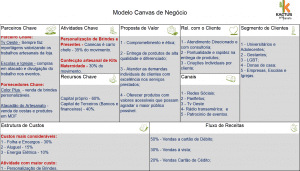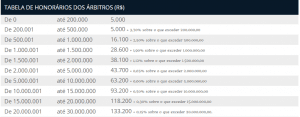ABSTRACT
BRONZATO, Anderson [1], DIAS, Silvia Menezes Pires [2]
BRONZATO, Anderson. DIAS, Silvia Menezes Pires. Accounting Expertise: New perspectives of the profession in the technological age. Revista Científica Multidisciplinar Núcleo do Conhecimento. Year 06, Ed. 02, Vol. 10, pp. 42-47. February 2021. ISSN: 2448-0959, Access Link: https://www.nucleodoconhecimento.com.br/accounting/perspectives-of-the-profession, DOI: 10.32749/nucleodoconhecimento.com.br/accounting/perspectives-of-the-profession
ABSTRACT
With the coming of technology, the accounting expert, professional who performs the technical analysis of documents in order to find truths in an investigation, massively included technology and artificial intelligence in his work routine. As a result of an inherent expansion to information, communication, education and services, this professional must adapt and update themselves in the face of the new needs of a world based on technology. Thus, this summary aimed to verify how accounting experts deal with and accept technology as important to the work routine. An online questionnaire was applied, collecting information regarding the use of the computer for the development of the activities of the profession. The results obtained show that the accountants recognize the importance of technology and the need for its use for the practice of the profession. However, most claim to know little or medium about artificial intelligence. The data presented here show that, although they know the importance of technology, accounting experts have limited knowledge on the subject. The professionals also stated that the technology did not cause changes in their routines, which differs from what was observed in the practical performance of these accounting experts.
Keywords: Accounting Expertise, technology era, Accountant Expert, Accounting Expert.
INTRODUCTION
In the post-industrial era, the labor market has transformed, making professionals increasingly dependent on technology for the day-to-day life of their labor services. For the accounting expert would not be different, its multidisciplinary qualification accompanies the needs of the market. This professional technically analyzes documents and materials available in search of truths present in facts and evidence stemming from a given investigation and, as a consequence of the post-industrial era, has used technology increasingly in his work routine (BRONZATO, 2021).
To practice the profession of expert accountant, the professional needs to be registered in his competent class body, prove his performance in continuing education programs and be a solid knowledge in the subject that performs expertise. The range of action of the expert-accountant is immense, providing services to both individuals and legal in judicial and/ or extrajudicial spheres. In this scenario, it is inherent to the professional to act, for example, in criminal, civil courts, family, public farm and tax executions, peritifing various taxes, such as IPTU and ICMS. Thus, the use of technology by the professional becomes intrinsic to their performance (BRONZATO, 2021).
And when we talk about the performance of the expert accountant, it is essential to mention the expert report, through which the activity is consolidated, that is, where any technical-scientific procedure used for the collection of evidence that will culminate in the verification of a given fact, that is, the accounting expertise will be documented. Such expertise, in turn, can be judicial, semi judicial, extrajudicial or arbitral (BRONZATO, 2021).
- Judicial accounting expertise – used in judicial decisions involving litigation in the economic interests of the parties;
- Semi-judicial accounting expertise – usually carried out by law enforcement authorities and may occasionally be part of legal proceedings;
- Extrajudicial accounting expertise – carried out at the arbitral, state or voluntary spheres, may also be demonstrative, discriminatory or demonstrative;
- Arbitration accounting expertise – optional, however, and it is up to the parties to comply with the obligations agreed herein.
The beginning of the 21st century marked the emergence of a new Era, based, among other factors, on technological innovations that contributed to a great advance of society and its generated knowledge, culminating in more dynamic, fast and flexible interpersonal relationships. In this sense, the Information Age brings with it integrative technologies for the various human activities, collaborating and also influencing labor activities alone, as well as working relationships (BRONZATO, 2021).
In the strict sense, the accounting expert needs to adapt and update himself in the face of the new structures implemented with the resulting of a technology that has changed an entire chain acting irreversibly, forcing the professional to leave an operational environment to immerse himself in a strategy-based performance. As a result of all technological advances, human beings were partially replaced by artificial intelligence, which expanded access to information, communication, education and services, however, on the other hand, the likelihood of cyber attacks on a vulnerable technology increased and could reach global proportions (BRONZATO, 2021).
DEVELOPMENT
With technological advances, professions that perform their activities based on standardized scripts and protocols have undergone a process of information automation, inserting information technology into their routine. As a result, several companies began to use computer programs with artificial intelligence to perform functions performed by humans, which may result in the loss of about 800 million jobs by 2030 (BRONZATO, 2021).
As for accounting expertise, it is undeniable the use of technological tools in both accounting and law, however, it should be taken into account that life experience is a determining factor in professional success that results in full exercise of the profession. Technological participation in the area allowed to streamline processes while reducing costs, often maintaining the security of transactions. In this sense, artificial intelligence improved the accounting expert’s routine at four different levels, namely: (i) digital loading of documents and searching through texts, (ii) recognition of standard clauses, (iii) pattern localization based on previously configured models, (iv) identification of patterns at clause level by grouping. In practice, technology is able to streamline processes, eliminate temporary loss of file in notary, store data, among other possibilities (BRONZATO, 2021).
An example of a program created to assist professionals is Contract Intelligence (COIN), which analyzes financial contracts for commercial lending in seconds, replacing the more than three hundred hours dedicated by lawyers over the course of a year, as well as dramatically mitigating human errors. For accounting experts, a similar tool can be used during the comparison of records and in the investigation of documents derived from extrajudicial expertise (BRONZATO, 2021).
In a technological age, we must not forget that knowledge is provisional, requiring the professional to constantly update it. In this respect, resistance to change is common, but it is broken while the benefits are exposed and understood. Thus, continuing education is essential in this period of adaptation (BRONZATO, 2021).
In this new scenario, there is a need to clarify how accounting experts deal with and understand the technology and artificial intelligence that comes from it and present in their work routine. Therefore, a field survey was conducted regarding the opinions of 44 individuals, who answered an online questionnaire between November 15 and 28, 2019, regarding the routine use of technologies and procedures arising from Artificial Intelligence (BRONZATO, 2021).
In the questionnaire, questions were asked to collect information related to the use of computer or internet to perform work activity, knowledge about artificial intelligence, how important the individual considers the presence of technologies in accounting skills activities, as well as their influences on the professional and his/her routine. The data were analyzed quantitatively, qualitatively and, in a third moment, a generalist analysis of the perception of individuals who are not accounting experts regarding their understanding of the profession (BRONZATO, 2021).
It was observed that of the 44 individuals who answered the questionnaire, 82% belonged to the Accounting area. Of these, only 23%, that is, 10 individuals claimed to practice the profession. Furthermore, a small portion corresponding to 3.2% reported accounting experts (BRONZATO, 2021).
Among the 10 individuals who worked in the profession, 4 were pursuing strictu sensu graduate studies at master’s or doctorate level, while 1 reported also being graduated in another area. Two individuals reported being bacharéis, and another 3 did not specify their level of university education (BRONZATO, 2021).
When asked about the use of a computer or internet to practice their profession, all 10 individuals answered using this information technology, thus recognizing it as inherent to the work routine. Similarly, 100% of the accounting experts who answered the questionnaire considered that communication and information technologies are very important for the practice of the profession. Unanimity in these aspects strongly suggests that the improvement of the professional accounting expert goes beyond in situ updates, and essential knowledge is also required to deal with information technologies, which are absolutely inserted in their routine (BRONZATO, 2021).
In relation to the level of knowledge about Artificial Intelligence, half of the individuals, that is, 5 stated that they knew little, while 4 reported knowing in a median way. Only 2 individuals reported not knowing Artificial Intelligence. With these data, it is suggested that, although accounting experts evaluate technology as very important and inherent to the exercise of their respective professions, most claim to know little or medium about artificial intelligence, thus showing a limited knowledge on the subject (BRONZATO, 2021).
Although most accounting experts say they know little about Artificial Intelligence, the data collected show that 80% comes from this technology as important to the work of the accounting expert. This divergence between importance and knowledge of cause suggests that experts, although they recognize the need for these technologies, have little knowledge about Artificial Intelligence resources implemented in the routine of the profession. In fact, these resources allow, among other aspects, the import of digital documents, the reading of reports by the computer and the identification of documentary patterns, culminating in the optimization of time and labor (BRONZATO, 2021).
Interestingly, half of the accounting experts who answered the questionnaire stated that the expert did not suffer changes in his routine, caused by information technology, which may indicate professional stagnation, despite the clear recognition of the importance of the use of these tools in the area of activity (BRONZATO, 2021).
In fact, information technology is commonly used by the accounting expert, whether for data analysis and processing, or for database research, automatic mathematical calculations, among other tools. Interestingly, many professionals who answered the questionnaire reported no changes from technology in their routines, which differs from what was observed in the practice of these accounting experts (BRONZATO, 2021).
FINAL CONSIDERATIONS
The work presented the perspectives of accounting expertise professionals regarding the use of new communication and information technologies in the exercise of their function. Technology promoted a clear and positive change in the work of these professionals, optimizing time if well used. The questionnaire applied to more than 40 people, of whom 10 were accounting experts, demonstrated the insertion of Artificial Intelligence in its routine tasks and was still undoubtedly pointed out as of paramount importance for the development of the work activities of the profession. Although the concept of Artificial Intelligence is little known in the practice that is implemented, this technology is widely used in the routine of the accounting expert, among other factors, for the analysis of reports and for the aid of the diagnosis of a given fact. Despite the fear about the substitution of men’s work by machines, it is known that information technologies are undeniable tools for the improvement and optimization of our work routine. A greater knowledge, updating and consequent use of Artificial Intelligence can potentially result in a growth of the accounting expert in the professional sphere.
REFERENCE
BRONZATO, Anderson de Araújo. A. As novas perspectivas profissionais do perito contábil. Acesso em 04 de janeiro de 2021. Disponível em: < https://www.researchgate.net/publication/341626531_AS_NOVAS_PERSPECTIVAS_PROFISSIONAIS_DO_PERITO_CONTABIL_THE_NEW_PROFESSIONAL_PERSPECTIVES_OF_THE_FORENSICS_ACCOUNTING_EXPERT>
[1] Candidate for the Master’s Degree in Information Technology, Lato Sensu Graduate in Judicial Expertise and Actuarial Practices with teaching in Higher Education, Lato Sensu Graduate in Controllership and Finance and Bachelor of Accounting.
[2] Guidance counselor. Master’s degree in Information Sciences.
Submitted: January, 2021.
Approved: February, 2021.
